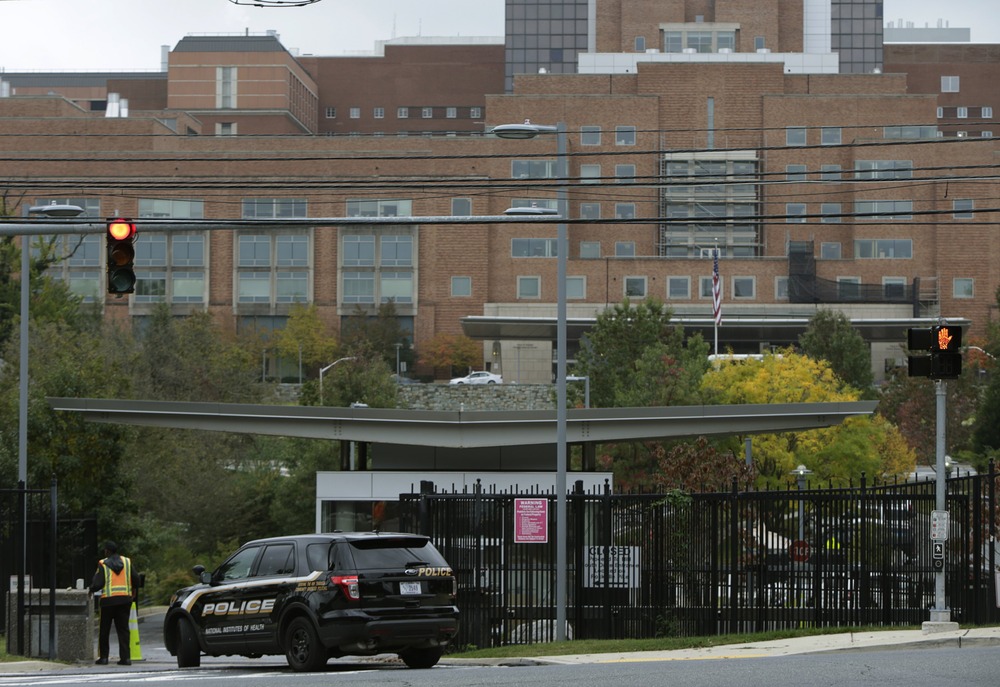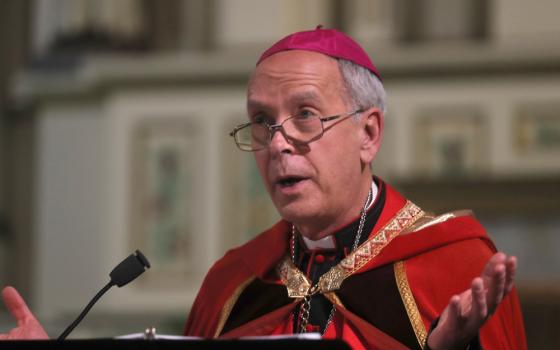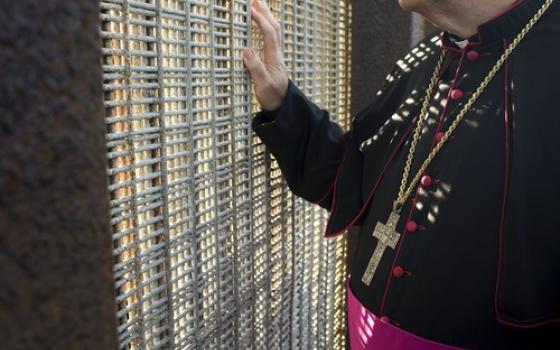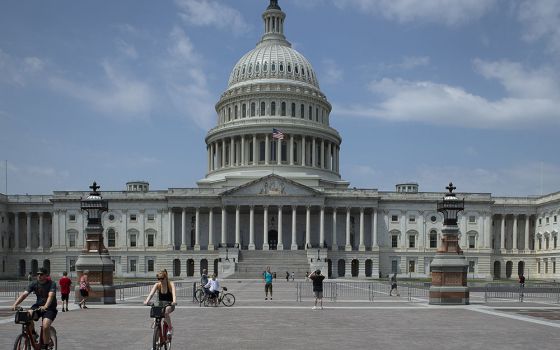
A security personnel guard is seen in a file photo outside the patient's entrance at the National Institutes of Health in Bethesda, Md. A federal judge in Boston has ordered a nationwide temporary pause on cuts the Trump administration wants to make to NIH funding; the Trump plan is to slash research overhead payments to grant recipients -- among them Catholic institutions. (OSV News/Gary Cameron, Reuters)
Ongoing uncertainty about funding from the National Institutes of Health could imperil medical research at academic institutions all over the country, including Catholic institutions, multiple sources told OSV News.
NIH recently announced it would limit the amount of funding for "indirect funds," those meant for administrative costs, to 15%, which would result in cuts of about $4 billion in federal funding for research at the nation’s universities, cancer centers and hospitals. The announcement pointed to lower rates for private grants.
The White House argued the move would reduce "exorbitant" overhead and would not amount to "any cuts to actual research."
But researchers said those funds are necessary to purchase and maintain necessary components of their research, such as electricity bills, security, and maintaining sterile environments or sophisticated equipment.
Twenty-two U.S. states sued to block the policy change, and a federal judge temporarily blocked the cuts. But Catholic research institutions were among those who expressed concern about the future of their research endeavors as a result.
A spokesperson for the University of Notre Dame told OSV News, "We are actively monitoring the situation in Washington and working nonstop to document the impacts thus far."
"We are also coordinating with key partners, such as the Association of American Universities (AAU), the Science Coalition and our partners across Indiana, to underscore the clear value proposition of cutting-edge scientific research, biomedical, global affairs and otherwise," the statement said. "The research that Notre Dame and our partners in higher education do is of critical importance to the nation and the world, and we are working diligently to ensure that it continues uninterrupted."
Jonathan Lowery, assistant provost for research and scholarship for Marian University in Indianapolis, told OSV News, "One thing you will know about researchers is that we try to minimize risk and variability as much as possible.
"A huge, a huge portion of that is finding ways to do our science in a sustainable way," he said. "And if we are relying on a source of funds, if that suddenly becomes unstable, it can completely destroy and invalidate anything that's been done in a project up to that point."
Operated by the Sisters of St. Francis, Marian is the nation's first Franciscan university to be designated a research university by the Carnegie Classifications of Institutions of Higher Education.
Advertisement
Lowery, who oversees an NIH grant at the university, said making up the federal grants with private funding is not tenable.
"It's very, very difficult to grow in any reliable fashion through private funding," he said. "Growing it on the backs of students paying tuition is not our model, it's not a just model of growing an institution's research profile. So we're more and more expecting our researchers to seek those external, especially governmental funds, to grow their programs."
Asked about the White House framing of overhead costs as "exorbitant," Lowery said there is a broader "perception that research should be cheaper and institutions should not be so reliant on federal dollars for funding premier research."
"I make purchase orders, I pay credit card bills, I fund my own program. Research is just simply incredibly expensive, and we are fortunate in the U.S. that we have an entity like the National Institutes of Health that fund the best science at such an enormously high level as compared to other countries," he said. "And without that stream of funds, we would not be at the top of the heap for technology and health care solutions and so forth. Institutions are reliant on these dollars to do the best work that we can."
"Everyone wants taxpayer dollars to be used effectively and efficiently, and to get rid of true and proper waste," he added, but "when we receive these funds from the NIH, they're used for supporting true and proper overhead for the research environment," which includes "IT systems, the heating and cooling systems, the electronics, all the way down to maintaining a safe Chemical Hygiene Plan."
But he said the university only embarks on research that "has fully been vetted internally as a mission fit for us as a Catholic institution," before it seeks grant funds.
Asked for his thoughts about what the potential cuts might mean for their research, Lowery said, "the worst case scenario is a grant that we were relying on is rescinded, and that program would stop."
"Even if the funds were frozen and then reactivated, the instability of that system is catastrophic for research productivity and moving a project forward," he said.







